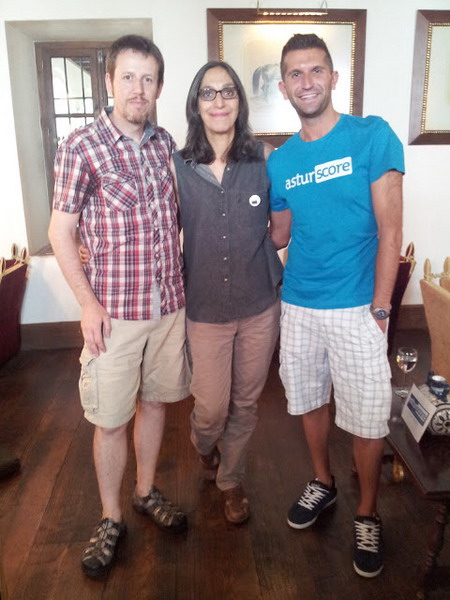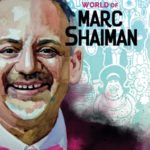Ethel: Interview with Miriam Cutler
YOU CAN ALSO READ THIS INTERVIEW IN ITS ORIGINAL LANGUAGE: SPANISH!!
Ethel – The Documentary and its music (with Miriam Cutler)
 Ethel, besides being a nice old lady of 83 years, is part of the North American history, or at least, she’s a big part of contemporary history. If we tell you that is her full name is Ethel Skakel (her maiden name), it wouldn’t probably ring a bell, but if tell you we’re talking about Ethel Kennedy (her married name), things change, don’t they?
Ethel, besides being a nice old lady of 83 years, is part of the North American history, or at least, she’s a big part of contemporary history. If we tell you that is her full name is Ethel Skakel (her maiden name), it wouldn’t probably ring a bell, but if tell you we’re talking about Ethel Kennedy (her married name), things change, don’t they?
Robert Kennedy’s wife since she was 22 years old till his assassination, and mother of 11 children together, Ethel has lived a very intense time in American politics, being wife of Robert Kennedy on one side, and being sister-in-law of President John F. Kennedy on the other side (from the moment he started campaigning, until he arrived to the White House).
Of the 11 children they had together, the youngest child, Rory Kennedy (who didn’tget the chance to meet her father), is an acclaimed filmmaker and producer of documentaries with a social and political focus, and she has been responsible to bring to the screen Ethel’s life, her mother’s life, because… who would be better than her, to tell the story of his family through her mother’s eyes?
 As it happened in other projects before, Rory Kennedy asked composer Miriam Cutler to write music for this project.
As it happened in other projects before, Rory Kennedy asked composer Miriam Cutler to write music for this project.
Miriam, who attended the «International Film Music Festival – Cordoba Province 2013» in June, gave us the opportunity to hear and enjoy a short but sweet suite of Ethel’s soundtrack during the concert «Goldspirits Awards – The Best of Film Music 2012/2013 «.
Although currently there’s no specific date for an official release of the soundtrack (which is expected to be announced in the next weeks), in Asturscore,we’ve had the opportunity to listen to a promotional CD, and we can say that we love it.
The music is melodic, fun, agile and homely, trying to portray the historic experiences that the Kennedy family has lived, from the point of view of their elder member, Ethel, first as wife of Robert Kennedy and then as his widow. This is why, despite the cheerful and relaxed tone that can be found in most of the music and in most of the documentary, dramatic moments are not avoided,to give way to more emotions in the music when necessary (as in the tracks «JFK Funeral» or «MLK Shot»), adding the warmth of the guitar or of the violin, to the dominant piano sound, that sets the pace and tone for most of the composition.
By courtesy of the composer, we will share two exclusives with all of you.
The first is a link to a selection of 15 songs written for the documentary (although they are a slightly different version that the one that will appear on the final CD, since final studio mixes and adjustments will be made).
The second is an exclusive interview we conducted with Miriam Cutler for Asturscore, talking about the process to create the music for this documentary. We hope you will enjoy it!
Interview with Miriam Cutler
 Thank you very much Miriam, for answering some questions for Asturscore about your music in Ethel, one of your last works. First of all, tell us…. how did you get to this project?
Thank you very much Miriam, for answering some questions for Asturscore about your music in Ethel, one of your last works. First of all, tell us…. how did you get to this project?
I have worked with Rory Kennedy on several other films, including a couple that her company, Moxie Firecracker, has produced. I have enormous respect for her work as a filmmaker, journalist, and activist, so when she asked me to work on this film about her family, I was thrilled and honored.
We’ve heard that you like reading about «American Politics», so maybe you knew the story beforehand but… did you expect what you were going to find? Or did the documentary surprise you? What was your first reaction when you saw it?
Actually, I was a kid when John F. Kennedy was president, and remember most of the events in the film very well. Memories from the time that President Kennedy was assassinated, Malcom X, Medger Evers, Martin Luther King, Robert Kennedy, the Civil Rights struggles, through the Viet Nam War are burned into my being. The events during this period were a painful and poignant part of my growing up. Experiencing those times through the prism of Rory’s family was really fascinating, since I had my own personal experiences of many of those same events. It was really emotional reliving those times as an adult. The fact that Rory was born after her father died was especially bittersweet.
Did you meet Ethel after or before composing the music? How was your first time with her?
Mrs. Kennedy lives on the East Coast, so I never met her until we premiered at Sundance in 2012. She is a wonderfully spirited person with an amazing breadth of experiences to share. She was an integral part of so much American history and moved among the powerful and famous people who shaped all of our lives. I was in awe.
You have worked in several documentaries with her daughter, Rory Kennedy, like: “Pandemic: Facing AIDS”, “Ghosts of Abu Ghraib”, “Thank You, Mr. President: Helen Thomas at the White House”, “The Fence” and now, “Ethel”. How is working with Rory? Do you have any future collaborations planned?
Rory is a tremendously talented, award winning filmmaker and very professional in the way she runs her organization. She has a great team around her and really knows how to find the right crew. She is prolific and always has a broadcast or distribution in place, so we are on strict and ambitious schedules. It’s intense and inspirational work and always worth giving 1000%. There’s no new collaboration immediately in the works, but you never know…
Did you get precise indications from Rory about the music, or did she leave this matter to your choice? How did you plan/decide the kind of music you were going to compose for this project?
For my part, I felt the score needed to be sweeping, romantic, and classy to capture those times and the iconic Kennedys, but also intimate and non-obtrusive for the personal reflections. I also wanted it to capture the Kennedy charm. I wanted strong themes that could be developed and varied to serve different moods. For me, nothing feels more cinematic than a large group of strings, and for the more personal moments, a combo that feels like a natural adaptation. Overall, the music was more about the narrative, rather than explicitly reflecting time periods.
Rory is very particular about music, but also open to trying adventurous styles. I think the music usually has a POV in her films and we always focus on setting the proper tone for each cue. She also has a great sense of humor and irony when appropriate and that’s really been fun for me. So usually she and the editor temp with something that sets the tone they are looking for, and I start exploring the essentials of that choice until I get on the same page. Because ETHEL was so personal, being about her mother, this process was even more sensitive than usual and we worked very hard to discover just the right balance of energy, humor, gravitas, and hope. Her main note to me was that she did not want the film to feel morose or too sad. Her family is very resilient and upbeat, not dwelling on the past, but facing the future with great hope.
We’ve had the opportunity to listen to a promo CD of your music, that has 29 tracks and nearly 60 minutes of music, and we loved it. We think that the score has a wonderful mix of melodic, fun and joyful passages (depicting the family relations, both internal and external), but at the same time, it tries to get to the personal story behind, giving it depth and emotion through the use of a piano, combined many times with the strings (among other instruments such as Electric Guitar, Mandolin, Harp…). Is there a release of this score planned soon?
Yes. I hope to have more information in the next week or two.
By the way… which publishing method do you prefer for your scores? Physical or digital?
At the beginning of my career, everything was still analog and if you listen to vinyl albums on a good system, or experience an analog recording studio, I think anyone will hear the difference in sonic quality. There’s just so much more audio information in analog technology. When digital was first introduced, there were huge debates comparing the qualitative differences.
That said, nowadays, most people, including me, listen to mp3 files on their mobile device through earbuds. I just read about a new product that will make it possible to have high fidelity digital on a dedicated mobile device with special headphones. I hope this idea takes off. We lose so much with mp3s, but they sure are convenient! So, I think listening to a CD on a good audio system is preferable for now to listening to an mp3 on earbuds.
In this promo, we have seen that there’re nearly 60 minutes of music for a 97 minutes documentary. Looks like a lot of music to compose! Was it difficult? How do you decide when you should put music in the story and when should you stay «silent»?
Actually, there’s 67 minutes of music in the film. There is definitely more music than usual in this documentary. The idea was to create the feeling of a musical narrative to tie together various types of material — on screen interviews, B roll, archival footage, verite scenes. Music is a glue that helps the story flow.
 I generally have a sense of pacing as I work my way through a film, and the filmmakers and I try to keep an awareness of this throughout the process. I would rather write more music than I need, and scale it back as we get a sense of the whole movie. Whenever possible, before I record, I try to watch the whole film with the filmmaker and get a feel for the way the music is serving it. It’s great to be able to make any adjustments before we’re committed to recorded cues. That said, the tweaking often continues through my mix, the film mix, and up until delivery.
I generally have a sense of pacing as I work my way through a film, and the filmmakers and I try to keep an awareness of this throughout the process. I would rather write more music than I need, and scale it back as we get a sense of the whole movie. Whenever possible, before I record, I try to watch the whole film with the filmmaker and get a feel for the way the music is serving it. It’s great to be able to make any adjustments before we’re committed to recorded cues. That said, the tweaking often continues through my mix, the film mix, and up until delivery.
We’d like to end this interview pointing thatJuly 18th, Emmy nominations are going to be announced, and your music for Ethel’s is on the ballots. Do you think this has had something to do with your recent invitation to join the Academy in the Documentary branch?
Actually, I was invited by filmmakers into the Documentary Branch. I think it’s mostly due to my body of work and my commitment to and involvement with the documentary community over the years. I also know that the Academy decided to issue more invitations than usual this year, in order to increase diversity in its membership. I’m very excited to get started!
Well, Miriam, thank you for your time, and…. We wish you good luck for the Emmy Awards!
Thank you – it’s an exciting time for me!




